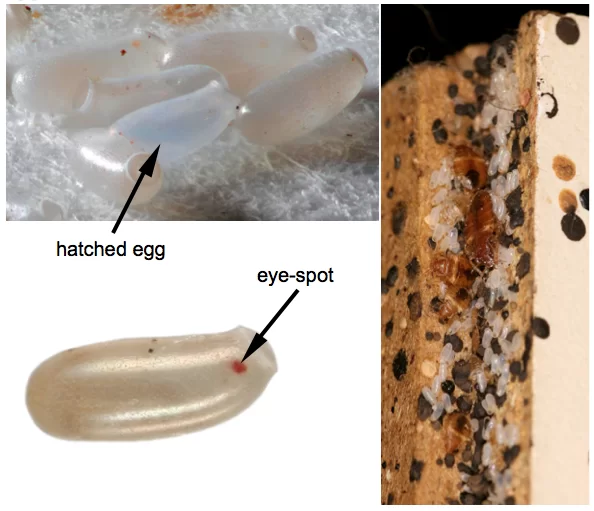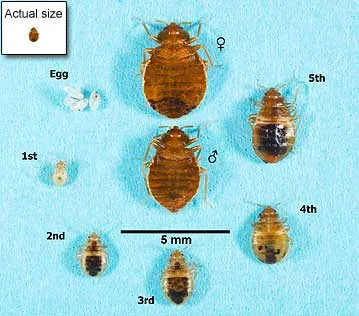
What Is The Best Way To Get Rid of Bed Bugs?
Bed bugs, those nocturnal pests that can turn a peaceful night’s sleep into a nightmare, are often a growing concern for homes and hotels as hotels are frequented by visitors, bringing in bedbugs from the outdoors. And when a family member returns home after traveling. In this article, we will explain the most effective ways to eliminate these unwanted bedbugs from your living spaces. From identifying bed bug infestations to understanding their habits and getting rid of them with DIY or professional help, this article aims to free you and your family from those pesky bed bugs that are giving you sleepless nights.
Introduction
Bed bugs, although small, can wreak havoc on your health. Effects ranging from no reaction to a small bite mark to, in rare cases, anaphylaxis (severe, whole-body reaction). Secondary infections of the skin from the bite reaction, such as impetigo, ecthyma, and lymphangitis. Mental health impacts on people living in infested homes Whether you’re dealing with a current infestation or looking to prevent future problems, finding the best way to get rid of bed bugs is essential.

Identifying Bed Bugs
Identifying bed bugs can be crucial for effective pest control. Here are some signs and characteristics to look for:
A. Bite Marks:
- • Bed bug bites are often red, and itchy, and appear in a clustered or linear pattern.
- • They are commonly found on areas of the body exposed during sleep, such as the face, neck, arms, and hands.
B. Physical Appearance:
- • Adult bed bugs are about the size of an apple seed, oval-shaped, and reddish-brown in color.
- • They have six legs and antennae, and their bodies become more swollen and elongated after feeding on blood.
C. Eggs and Nymphs:

- • Bed bug eggs are tiny, white, and difficult to see without magnification.
- • Nymphs are smaller versions of adult bed bugs and can range in size from 1 mm to 5 mm, depending on their developmental stage.
D. Shed Skins:
- • As bed bugs grow, they shed their exoskeletons, leaving behind translucent, empty skins. These can be found in areas where bed bugs hide.
E. Fecal Stains:
- • Dark, rust-colored or reddish-brown fecal stains may be present on bedding, mattresses, or nearby areas. These stains are a result of digested blood.
F. Musty Odor:
- • Some people report a sweet, musty odor in rooms infested with bed bugs. However, this may not always be a reliable indicator, as not everyone can detect the odor.
G. Hiding Places:
- • Bed bugs often hide in cracks and crevices, such as mattress seams, bed frames, headboards, and furniture.
- • Inspect these areas thoroughly for live bugs, eggs, or other signs of infestation.
H. Nighttime Activity:
- • Bed bugs are nocturnal and typically feed on their hosts at night. If you notice bites that seem to occur predominantly while you sleep, it may indicate a bed bug infestation.
If you suspect a bed bug infestation, it’s essential to take prompt action. Consult with a professional pest control service for an accurate identification and effective treatment plan.
Health Risks Associated with Bed Bugs
A. Allergic reactions
Bed bug bites can trigger allergic reactions in some individuals, ranging from mild irritation to severe responses. Understanding these health risks emphasizes the urgency of eliminating bed bugs promptly.
B. Mental health implications
Living with a bed bug infestation can lead to increased stress, anxiety, and sleep disturbances. Addressing the issue promptly is vital for mental well-being.
Prevention Methods
A. Securing bedding and furniture
Taking preventive measures, such as using bed bug-proof mattress covers and sealing cracks in furniture, can help safeguard your home.
B. Regular cleaning practices
Maintaining cleanliness is a powerful preventive strategy. Regular vacuuming, washing bedding in hot water, and decluttering can significantly reduce the risk of infestation.
C. Inspecting second-hand items
Before bringing used furniture or clothing into your home, conduct thorough inspections to ensure they are not harboring bed bugs.
DIY Solutions
A. Natural remedies
Explore natural solutions like diatomaceous earth, essential oils, and heat treatments as eco-friendly alternatives for controlling bed bug infestations.
B. Homemade insecticides
Create your own insecticides using household ingredients like vinegar and baking soda for an effective, budget-friendly approach.
Professional Bed Bugs Control Services
A. Benefits of hiring professionals
Professional pest control services offer expertise, experience, and access to advanced treatments that can swiftly and effectively eliminate bed bugs at your premises.
B. Choosing the right pest control service
Research and select a reputable pest control service with a proven track record of successfully eradicating bed bugs problems.
Importance of Timely Action
A. Rapid reproduction cycle of bed bugs

Bed bugs reproduce quickly, making swift action essential to prevent a small infestation from turning into a major problem.
B. Implications of delayed treatment
Delaying bed bug treatment can lead to increased difficulty in eradication, potential health risks, and additional expenses.
Understanding Bed Bug Habits
A. Nocturnal behavior
Knowing that bed bugs are most active at night can aid in the strategic placement of traps and treatments.
B. Preferred hiding spots
Understanding where bedbugs hide, such as in the cracks of mattresses, is important for targeted eradication efforts.
Challenges in Bed Bug Elimination
A. Resistance to certain pesticides
Some bed bugs have developed resistance to traditional pesticides, necessitating the use of alternative strategies.
B. Need for comprehensive strategies
Combining multiple approaches, such as heat treatments, insecticides, and preventive measures, is often required for successful bed bug elimination.
Tips for Travelers For Control Bed Bugs
A. Preventing infestations while traveling
Learn how to inspect hotel rooms and protect your luggage to avoid bringing bed bugs home from your travels.
B. Inspecting accommodations
Before settling into any accommodation, conduct a thorough inspection to ensure a bed bug-free environment.
Common Myths of Bed Bug
A. Misconceptions about bed bug behavior
Debunking myths such as bed bugs only infesting dirty spaces helps dispel misinformation and promotes accurate prevention strategies.
B. Debunking popular beliefs
Challenge common beliefs, such as the ineffectiveness of DIY solutions, to empower individuals to take proactive measures.
Conclusion
In conclusion, getting rid of bed bugs requires a combination of knowledge, vigilance, and timely action. By identifying, preventing, and addressing infestations using a comprehensive approach, you can reclaim your home and enjoy a peaceful, bed-bug-free environment.
Frequently Asked Questions (FAQs)
Q. How do I know if I have bed bugs?
A. Look for physical signs like bloodstains, fecal spots, and itchy welts on your skin. If in doubt, consult a pest control professional.
Q. Are DIY solutions effective in eliminating bed bugs?
A. While some DIY methods can be effective, severe infestations often require professional intervention for complete eradication.
Q. Can bed bugs be prevented entirely?
A. While prevention methods can significantly reduce the risk, it’s challenging to guarantee complete prevention due to factors like travel and communal spaces.
Q. What should I do if I find bed bugs in my home?
A. Act promptly by cleaning affected areas, using DIY treatments, and contacting a professional pest control service for a thorough inspection.
Q. Is it possible to travel without bringing bed bugs home?
A. Yes, thorough inspections of hotel rooms, luggage, and clothing can help prevent bed bugs from hitching a ride back home
